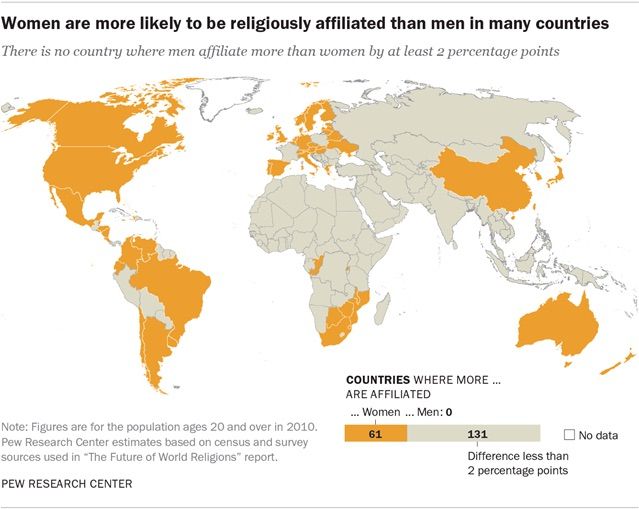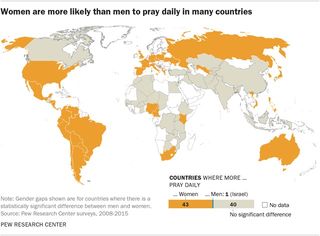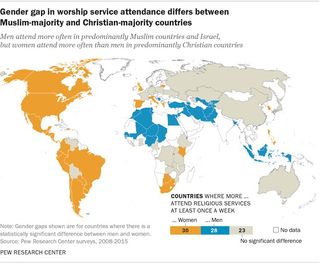Religious Reveal: Men Lag Behind Women in Devoutness

Despite the fact that most historical figures are male — such as Jesus, Muhammad and the Buddha — and that most conservative religious institutions rely on male leaders, including priests and Orthodox rabbis, new data shows that women today tend to be more religious than men.
The new survey results represent six faith groups (Christians, Muslims, Buddhists, Hindus, Jews and the religiously unaffiliated) from 84 different countries, according to the Pew Research Center, which collected the data from 2008 to 2015.
After sifting through the responses, Pew found that, in general, women are more devout than men on several measures of religious commitment. But among some groups, such as Orthodox Jews and Muslims, men tend to go to religious centers more than women do, likely because they are encouraged to take part in certain services, the report found. [8 Ways Religion Impacts Your Life]
Pew asked several questions to get a better idea of how religious people were. For instance, when asked whether they affiliate with a religion, more women than men said they identified with a faith group (83.4 percent versus 79.9 percent).
"This gap of 3.5 percentage points means that an estimated 97 million more women than men claim a religious affiliation worldwide, as of 2010," Pew said in a statement.
Moreover, women tend to pray more often than men do in about half, or 43, of the countries surveyed. Only Israel, in which about 22 percent of all Jewish adults identify as Orthodox, do men report praying more times per day than women. In the remaining countries, men and women reported praying an equal amount, Pew found.
Still, daily prayer had the largest gender gap (8 percent) of all of the survey questions. Even women who said they were religiously unaffiliated, including women in the United States and Uruguay, indicated that they prayed more times per day than unaffiliated men did.
Sign up for the Live Science daily newsletter now
Get the world’s most fascinating discoveries delivered straight to your inbox.

When asked how important religion was in their daily lives, women in 36 of the 84 countries rated it higher than their male counterparts did. But in 46 of the countries, men and women were equally likely to say that religion was "very important" to them. Only Israel and Mozambique had results showing that men were more likely to consider religion more important than women did.
However, nearly equal percentages of men and women reported belief in heaven, hell and angels, Pew found. But that wasn't universally the case: Women were more likely to believe in angels in 14 of the 63 countries that were asked this question. And men were more likely than women to believe in heaven and hell in Lebanon and in angels in Pakistan.
Muslims and Christians
Muslim men and women reported being about equally religious, but that wasn't the case with Christians.
Among Muslims, women reported praying more than men by only 2 percentage points in 40 of the countries surveyed. Moreover, Muslim men attended religious services, on average, 28 percent more often than women, likely because of social norms, Pew said. But on most other points, Muslim men and women reported similar levels of devoutness behaviors. [Evolution vs. Creationism: 6 Big Battles]
In contrast, Christian women reported being far more religious than Christian men did. In 54 countries, Christian women reported praying more by a gap of about 10 percentage points compared with men. Christian women were also more likely to say that religion was "very important" to them, giving them a 7-percentage-point lead over men in this category.
In addition, Christian women were about 7 percentage points more likely than Christian men to attend weekly religious services in 53 of the countries surveyed, Pew found.

It's not entirely clear why these gender disparities exist, but researchers have considered a range of sources, including varying biology, psychology, genetics, family environment, social status, workforce participation and a lack of "existential security" felt by many women because they generally are more afflicted than men by poverty, illness, old age and violence, Pew said.
The answer likely involves multiple factors, but there is still disagreement about which issues matter more, Pew reported.
Interestingly, women who work tended to report being less religious than women who don't earn a salary, even when the researchers accounted for other factors, such as education level, age and marital status, Pew said.
This analysis about the beliefs of employed women suggests that women are not universally more religious than men, but that their devoutness could be the result of nurture (for instance, social and cultural factors) rather than nature (for example, biological or evolutionary forces).
"[It] suggest[s] that social and cultural factors, such as religious traditions and workforce participation, play an important role in shaping the religious gender gap," Pew said.
Follow Laura Geggel on Twitter @LauraGeggel. Follow Live Science @livescience, Facebook & Google+. Original article on Live Science.

Laura is the archaeology and Life's Little Mysteries editor at Live Science. She also reports on general science, including paleontology. Her work has appeared in The New York Times, Scholastic, Popular Science and Spectrum, a site on autism research. She has won multiple awards from the Society of Professional Journalists and the Washington Newspaper Publishers Association for her reporting at a weekly newspaper near Seattle. Laura holds a bachelor's degree in English literature and psychology from Washington University in St. Louis and a master's degree in science writing from NYU.










